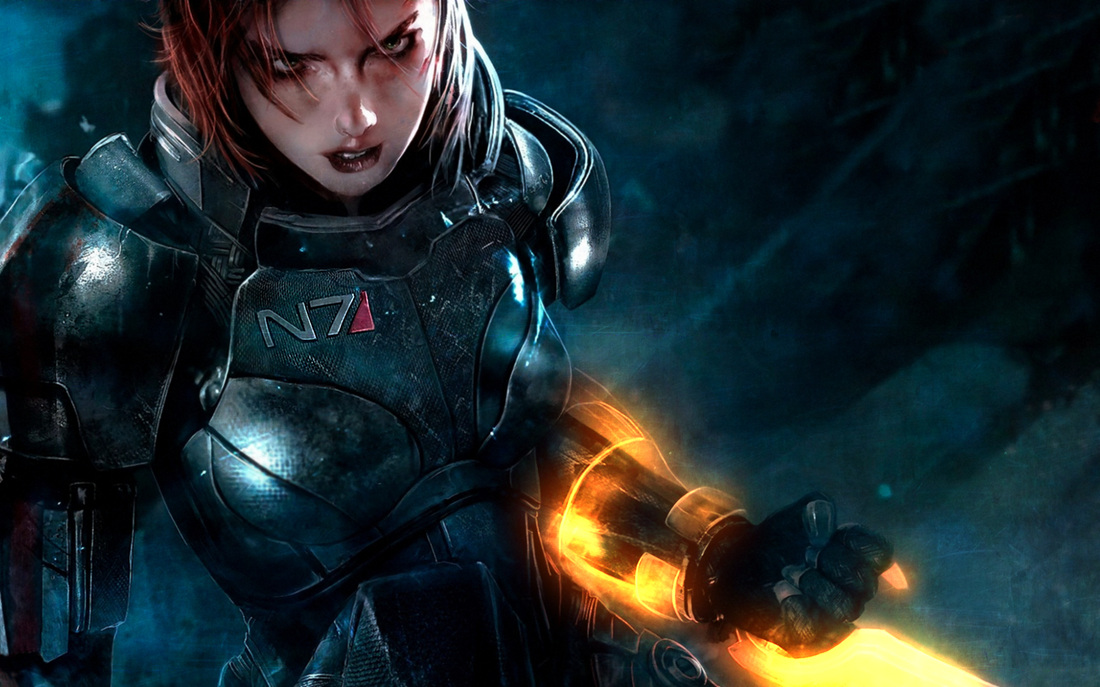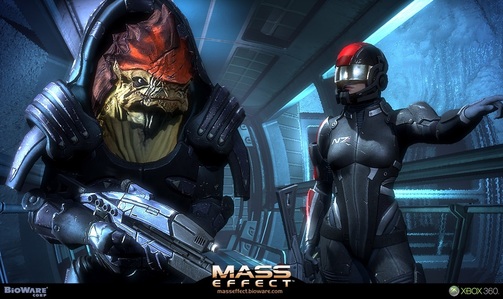"Women..."
-Urdnot Wrex, Mass Effect 3
So I was browsing GameInformer.com this morning in my college class, when I happened upon an article about female leads. Apparently, someone had asked Epic Games if we would ever see a female lead in a future installment of the their flagship franchise, Gears of War. Their response?
"That's certainly interesting, but I don't know. If you look at what sells, it's tough to justify something like that." -Chris Perna, Art Director
Now, before we get offended, he's not technically saying that they don't want to include a female lead at some point in the series. Their primary focus is, as is the case for just about everyone, money. And mo' money. Male leads, such as the series' iconic Marcus Fenix, are apparently what gamers feel the need to buy when they see them on the box cover. If that's the case, then gamers...
WE NEED TO OPEN OUR EYES.
Over the last few years, female protagonists of the industry have begun a crusade to push the increasingly dull male protagonists off of their pedestal; not only that, the portrayal of women in video games and the treatment of them have also begun to change. Lady-loving protagonists like Duke Nukem have been all but forgotten, thanks to this new attitude. I'm sure the surge of women gamers has also had a huge impact on the culture of the industry.
To further cement this viewpoint, I'll take you through one of my own adventures with a woman protagonist of today. She is an obvious heroine, who gained enough support from the outcry of fans to successfully share the spotlight with her male counterpart; the fans affectionately call her "FemShep." That's right, the female Commander Shepard.
"That's certainly interesting, but I don't know. If you look at what sells, it's tough to justify something like that." -Chris Perna, Art Director
Now, before we get offended, he's not technically saying that they don't want to include a female lead at some point in the series. Their primary focus is, as is the case for just about everyone, money. And mo' money. Male leads, such as the series' iconic Marcus Fenix, are apparently what gamers feel the need to buy when they see them on the box cover. If that's the case, then gamers...
WE NEED TO OPEN OUR EYES.
Over the last few years, female protagonists of the industry have begun a crusade to push the increasingly dull male protagonists off of their pedestal; not only that, the portrayal of women in video games and the treatment of them have also begun to change. Lady-loving protagonists like Duke Nukem have been all but forgotten, thanks to this new attitude. I'm sure the surge of women gamers has also had a huge impact on the culture of the industry.
To further cement this viewpoint, I'll take you through one of my own adventures with a woman protagonist of today. She is an obvious heroine, who gained enough support from the outcry of fans to successfully share the spotlight with her male counterpart; the fans affectionately call her "FemShep." That's right, the female Commander Shepard.
In 2007, BioWare's Mass Effect was released to critical acclaim, with many praising the story, realistic animations and the choices presented to the player. I was a big fan of the studio's previous RPG offering, Star Wars: Knights of the Old Republic, and had been desperately searching for any other information about another installment in the franchise. Sure, there was a KOTOR II, but it wasn't a BioWare game. I learned that they had given the reins to Obsidian Entertainment, which puzzled me. Why would you give away a franchise after making just one game? I decided to do a little more digging.
Eventually, I found out that BioWare had shifted their focus to one of their own original properties, and that original property happened to be in my GameInformer issue. When I found it, I was immediately enthralled. I remember the first screenshot I saw of the game:
Eventually, I found out that BioWare had shifted their focus to one of their own original properties, and that original property happened to be in my GameInformer issue. When I found it, I was immediately enthralled. I remember the first screenshot I saw of the game:
Sweet! It was a science fiction game where you were the commander of a ship called the Normandy and you could explore the universe. That was enough for me, I was hooked. I started reading anything I could about the property, looking at every screenshot I could find of this big-eared protagonist. Then, I stumbled upon another screenshot:
Woah, woah, woah! That doesn't look normal. And no, I"m not talking about the guy on the left, but rather the woman on the right. That's the same armor the big-eared guy was wearing, but clearly a woman's body. A female protagonist!
Once the game came out, I started like normal, choosing the male Shepard and getting my bearings with the controls. I got bored real quickly, not because of the game, but because I just hadn't escaped into the world. I was a guy in real life, so why am I just going to relive reality in this medium that begs for reality to disappear? So, I made up my mind. The next time I picked up the controller, I was a FemShep guy.
Carolyn Shepard was the first Shepard that I beat the game with. Once Mass Effect 2 rolled around, she was the first I imported into it, and again, the first I beat it with. Same with Mass Effect 3. I know I sound like a fanboy, but traveling with Carolyn through three games taught me something about the female protagonist and forever changed my perspective on video games.
First, Carolyn was a Paragon, which in regular terms means she wasn't ruthless or hungry for a fight. She was patient, understanding, and selfless. She treated everyone, whether it was Samara (my favorite Mass Effect character) or Diana Allers (YOU SUCK!), with respect and considered them part of her crew; therefore, she was responsible for all of them.
The next astounding thing I realized was that despite not being male, she could actually take all the damage, face all the threats and make all the hard choices that Male Shepard could. The trilogy was still an exceptional adventure and my heart sank watching her make those hard choices and live with the consequences. She also achieved all the victories as well. She killed Saren, saved the council, stopped Sovereign, defeated the Collectors, and valiantly fought off the Reapers battle-by-battle. Liara, Ashley/Kaidan, Garrus, and Tali all cared for Carolyn the same amount as they did for my (later) Male Shepard. So, I guess it can all be summed up by Yeoman Kelly Chambers:
Once the game came out, I started like normal, choosing the male Shepard and getting my bearings with the controls. I got bored real quickly, not because of the game, but because I just hadn't escaped into the world. I was a guy in real life, so why am I just going to relive reality in this medium that begs for reality to disappear? So, I made up my mind. The next time I picked up the controller, I was a FemShep guy.
Carolyn Shepard was the first Shepard that I beat the game with. Once Mass Effect 2 rolled around, she was the first I imported into it, and again, the first I beat it with. Same with Mass Effect 3. I know I sound like a fanboy, but traveling with Carolyn through three games taught me something about the female protagonist and forever changed my perspective on video games.
First, Carolyn was a Paragon, which in regular terms means she wasn't ruthless or hungry for a fight. She was patient, understanding, and selfless. She treated everyone, whether it was Samara (my favorite Mass Effect character) or Diana Allers (YOU SUCK!), with respect and considered them part of her crew; therefore, she was responsible for all of them.
The next astounding thing I realized was that despite not being male, she could actually take all the damage, face all the threats and make all the hard choices that Male Shepard could. The trilogy was still an exceptional adventure and my heart sank watching her make those hard choices and live with the consequences. She also achieved all the victories as well. She killed Saren, saved the council, stopped Sovereign, defeated the Collectors, and valiantly fought off the Reapers battle-by-battle. Liara, Ashley/Kaidan, Garrus, and Tali all cared for Carolyn the same amount as they did for my (later) Male Shepard. So, I guess it can all be summed up by Yeoman Kelly Chambers:
"Character matters, not race or gender."
FUN FACT: In the months before Mass Effect 3's launch, fan outcry over their affection of FemShep yielded a marketing campaign that gave the soldier her own canon look (decided by the fans), a place on Mass Effect 3's box art, and a trailer, named "Reinstated."
With FemShep's case presented, let me make something clear. I'm not saying that every protagonist should have a female counterpart. Some heroes are written specifically for their respective genders. Take Sam Fisher and Lara Croft, for instance. Splinter Cell would not be the same if Sam Fisher was converted to some crony old woman. The iconic dark humor just wouldn't fit. And Lara Croft is famous because she is female, and was one of the pioneers of the industry that began pushing for femininity in the medium.
The point I'm trying to get across is that we gamers should be open-minded. Game designers shouldn't be worried about sales being impacted by the gender of their protagonist. Creativity is limited when we close our minds to the ideas of others, and video games are historically linked to creativity, ever since their conception. Should a writer or designer imagine their story being told through a woman's eyes, then they should let their imaginations take them further. Worrying about what we are going to buy shouldn't be a factor.
EXTERNAL LINKS: http://www.gameinformer.com/b/news/archive/2013/02/18/gears-of-war-may-never-get-a-female-lead.aspx
The point I'm trying to get across is that we gamers should be open-minded. Game designers shouldn't be worried about sales being impacted by the gender of their protagonist. Creativity is limited when we close our minds to the ideas of others, and video games are historically linked to creativity, ever since their conception. Should a writer or designer imagine their story being told through a woman's eyes, then they should let their imaginations take them further. Worrying about what we are going to buy shouldn't be a factor.
EXTERNAL LINKS: http://www.gameinformer.com/b/news/archive/2013/02/18/gears-of-war-may-never-get-a-female-lead.aspx



 RSS Feed
RSS Feed